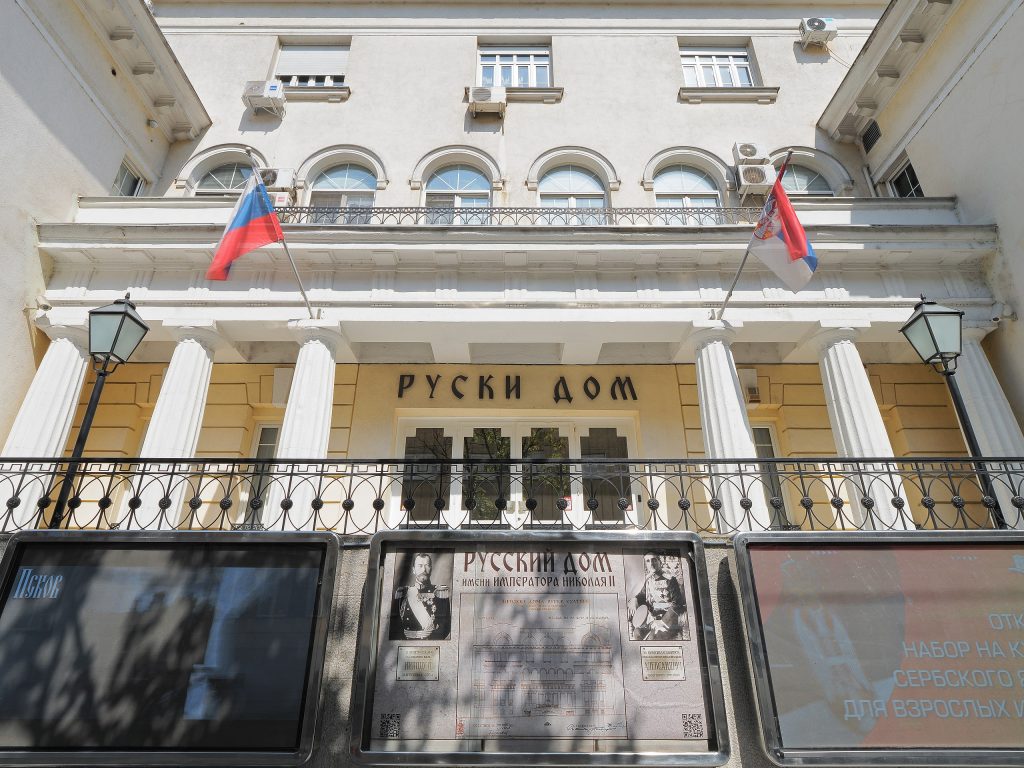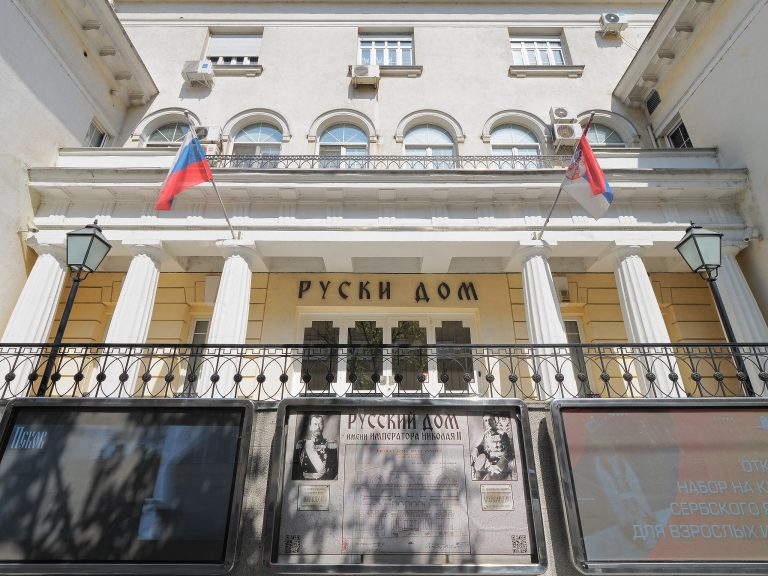It is commonly said that Russia's aggression against Ukraine has further exposed the fault lines between Moscow and the West in the Western Balkans, and that Russia's aggressive posture in the region is expected to grow as a result of the war. Is this fear legitimate, or will the Kremlin’s influence in the Western Balkans diminish as a result of Putin’s invasion of Ukraine?
Russia's soft power reflected in historical Slavic, cultural, and religious relations is often cited as major reasons for a close relationship between Serbia and Russia in the first place (although Russia and Serbia were in fact at odds with each other throughout most of the 20th century). In addition to Moscow's diplomatic support for Serbia's position on Kosovo and relations in the energy field. Serbia's refusal to join European Union sanctions against Russia is considered an indication of Russian influence through the media and political associations.
However, recent research shows that the perceived role Moscow continues to play in the Western Balkans is often exaggerated. Instead, Russian influence is largely facilitated and shaped by local leaders who prefer to maintain the status quo and capitalize on the pro-Russian sentiment of their voters. Contrary to popular belief, the war in Ukraine has in fact exposed Russia's weakness in the region and may serve as an indicator of its global decline.

Russian Center of Science and Culture, Belgrade. Source: Wikipedia
Adapt to change
The war in Ukraine brought about a major geopolitical shift that made Russia the most hostile country to EU interests, and indirectly or directly affected almost all EU policies. The invasion of Ukraine changed the EU's defence, security, trade, environment and enlargement policies, to name a few. With more than 50% of gas supplies imported from Russia in 2021, by October 2022, EU member states had already reduced this proportion to just 12% and reached a number of deals with alternative suppliers. Despite internal disagreements (eg Hungary), the Union adopted 11 packages of sanctions against Russia, unprecedented in size and scope, which severed almost all economic, diplomatic and political ties with its largest neighbour.
The Russian invasion of Ukraine also brought the issue of European Union enlargement back onto the political agenda. Over the past year, Ukraine and Moldova have been granted EU candidate status, and Georgia has become a potential candidate. At the same time, new momentum emerged in the Western Balkans with the opening of enlargement negotiations with Albania and North Macedonia and the agreement to place Bosnia and Herzegovina as a candidate.
Although Russia's war on Ukraine has brought the unstable Western Balkan region back into the spotlight, it is still very difficult to say whether EU member states are suffering from enlargement fatigue or not. no. The EU has recognized that regional divisions and tensions make the region particularly vulnerable to Russian influence, but it has not yet succeeded in “igniting the flame of enlargement,” let alone resolving the frozen conflicts in Bosnia and Herzegovina and between Kosovo and Serbia.
But the enlargement debate has become more geopolitical than ever, and the incompatibility between nurturing a close relationship with Russia and progress on the path to European integration has become clear. Four of the six Western Balkan countries (Albania, Kosovo, Montenegro and North Macedonia) joined the EU's Common Foreign and Security Policy by imposing sanctions on Russia and Belarus. Serbia and Bosnia and Herzegovina (over Republika Srpska's objection) have not yet joined the sanctions, despite repeated calls to do so.
Available research points to Serbia as an outlier globally in terms of its pro-Russian stance in the context of the war in Ukraine. For example, 63 percent of the population of Serbia blames the West for the current conflict between Russia and Ukraine, the highest number ever of any of the 22 countries surveyed. Similarly, A large majority Of citizens (78.7%) oppose imposing sanctions on Russia. This, coupled with the Serbian leadership's refusal to join the sanctions against Russia, is often seen as an example of Russian interference in the Balkans and the influence that Russia still possesses to this day. However, the picture is much more nuanced, and the dynamic of Russian propaganda in the Western Balkans is more dependent and influenced by local leaders than by Moscow.
How strong is Russian influence in the Balkans?
Russian influence in the Western Balkans has traditionally relied on its soft power, the energy sector, and its diplomatic support for Serbia's position on Kosovo. Russia's religious, cultural and historical relationship with the region's Orthodox population has been cited as a reason for Russia's attractiveness. By obtaining a seat on the UN Security Council, Russia ensured that Kosovo's independence would not gain legitimacy within the UN. In addition, Russia was traditionally Most dominant A non-EU country in the energy sector in the Western Balkans. However, with the ongoing diversification of energy supplies and Russia's diplomatic weakness due to the war in Ukraine, the question now is what are Russia's real and perceived influences in the region?
Recently research The Belgrade Center for Security Policy (BCSP) paints a fairly accurate picture of Russian influence in the region. The author, Maxim Samorokov, says that despite the seeming status quo, with Serbian President Aleksandar Vucic signing a new three-year agreement with Gazprom, and Milorad Dodik (President of Republika Srpska) frequently visiting Moscow, Russia's position is much weaker. . than before February 2022.
“Outside energy, Russia has become almost irrelevant to the Balkan economies, and the refusal of Serbia and Bosnia and Herzegovina…to join anti-Russian sanctions makes little difference,” the report said. More specifically, this and other research point to four main trends. First, when it comes to the energy sector, there are no expectations of new investments and projects in the foreseeable future. Countries are already looking for alternative supplies and some energy demand (such as gas) could be replaced by the end of this year. Second, there is little or no economic cooperation with most Western Balkan countries. Serbia is the country with the largest trade share with Russia, but this figure does not exceed six percent. All economies are deeply integrated with those of EU members, and although Serbia has not imposed sanctions on Russia, many companies must comply with the sanctions in order to continue their business in the more profitable EU market.
Third, the invasion of Ukraine and Russia's flagrant violation of international law, including its war crimes, have lowered Russia's standing on the international stage. Even when it comes to Kosovo, Russia is no longer Serbia's desired mediator. The recent Ohrid Agreement, a result of increased diplomatic engagement between the United States and the European Union, was negotiated without any Russian participation. The Serbian President can often be seen accompanied by the Russian Ambassador to Serbia, Alexander Botsan-Kharchenko, talking about Russian support and military assistance. However, he knows very well that “Moscow suffers from a severe lack of resources and is unable to deploy its military power effectively in the Western Balkans.'
Likewise, and fourth, according to Samorukov, Russian personnel responsible for diplomacy in the Western Balkans already have extensive knowledge and contacts in the region. However, they do not have the status among the Kremlin elite to draw the attention of Balkan issues to Vladimir Putin, who has never been romantically linked to this region. Given the repressive and centralized nature of Russia's decision-making process, politics in the Western Balkans is more on autopilot than part of a complex strategy.
Russia is not the West
All this does not mean that Russia plays no role in Balkan politics. However, the reality is that it is dependent on the local elite, which exploits perceived Russian support for its own benefit. The Orthodox and Slavic connection to Russia has been used by many local politicians to gain votes among pro-Russian segments of the population. However, this fetishization of Russia constitutes an atypical example of soft power, where Russia is loved not for what it is, but for what it is. like to explain By Vuk Vuksanović (BCSP): “Russia is not the West, which means that Russia’s soft power capital in Serbia is largely the product of bitter memories of the 1990s, a feeling of rejection and ostracism by the West, and frustration with Kosovo’s independence and independence.” The idea that Russia acts as a counterforce to Western supremacy.
This dissatisfaction and bitterness towards the West has intensified in the past ten years in Serbia with Vucic and his Serbian Progressive Party, which has had to resort internally to a right-wing base while externally pretending to be pro-Western. The aggression against Ukraine intensified pressure on Vucic to sever ties with Russia and join the sanctions, which in turn intensified the pro-Russian propaganda produced by the media controlled by the Serbian regime. Contrary to popular opinion or common experience in other countries, the main producers of pro-Russian propaganda are not Sputnik or Russia Today But the tabloids and TV stations.
Thus, while it is true that imposing sanctions on Russia would be a politically unpopular and difficult move for any politician in the Serbian ruling party to make, it is also true that it is not Russia that is driving the narrative in Serbia, but rather the domestic regime. Russia's role and influence have been deliberately exaggerated for many years so that Vucic can have excuses for not keeping his promises in the first place regarding Kosovo and playing the card of the man who stands up to the Russian challenge.
The greatest threat to regional stability, as well as Serbia's EU ambitions and Western orientation, is not Russia, but the regime of Aleksandar Vucic. Likewise, it is Milorad Dodik who is fueling interethnic animosities by refusing to join EU sanctions and capitalizing on pro-Russian sentiment among voters. Politically, it is more convenient to be accused of being a friend of Putin than to deal with the accumulated issues of corruption, nepotism and crime, as we saw in the recent example of Alexander Volin. Volin was the current director of the Serbian Security Intelligence Agency You approve it By the U.S. Department of the Treasury's Office of Foreign Assets Control to promote corruption, including involvement in a drug trafficking ring and illicit arms trafficking, and to provide a platform for Russian influence.
Vucic spun the story of Volin being punished only because Serbia did not impose sanctions on Russia, because friendship with Russia seemed better than direct involvement in criminal activities. And let us not be mistaken, Volin is Vucic's aide – not Putin – and whose role as head of the agency is to ensure that Aleksandar Vucic's regime remains intact.
Soft power or smoke and mirrors?
Russia has been present in the Western Balkans for the past twenty years. Symbolically, economically, and politically, it built relationships with these countries and exploited their grievances and frustrations with the West. The failure of the European Union and NATO to achieve integration between the region, resolve the conflicts in Bosnia and Herzegovina, and resolve the situation in Kosovo was a reason for creating space for Russian influence and the dependence of local leaders on Moscow. However, Russia has never been able to establish itself as a dominant trading partner in the region. Thus, economic cooperation remains modest and will only decline further, while energy relations will inevitably decline.
In fact, the war in Ukraine has weakened Russia's position in the Balkans. The only area in which we see a strong Russian presence is propaganda, and the incredible support and popularity enjoyed by Putin and Russia among some segments of the population (Serbia and Republika Srpska) indicates this. However, the spread of pro-Russian rhetoric is controlled by the media, which is controlled by local authoritarian leaders, most notably Vucic and Dodik. As long as they aim to remain in power at all costs, exploit anti-Western sentiment and inflame the imagination of the majority of the population with pro-Russian propaganda, Russia will remain present in the Balkans.

